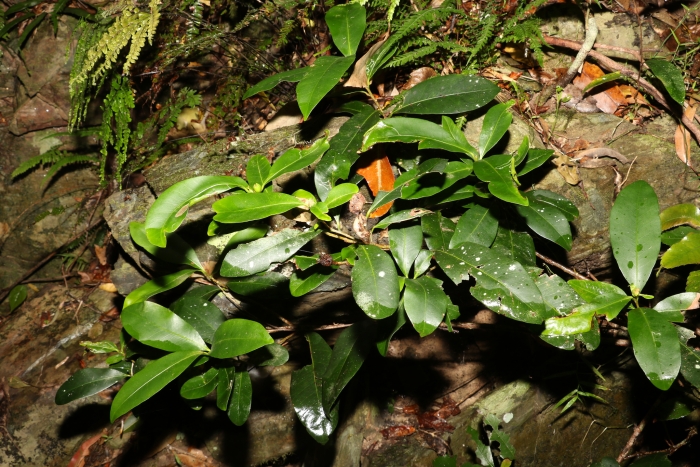Black Apple
(Planchonella australis)
Black Apple (Planchonella australis)
/
/

© Greg Tasney
CC BY-SA 4.0
Image By:
© Greg Tasney
Recorded By:
Copyright:
CC BY-SA 4.0
Copyright Notice:
Photo by: © Greg Tasney | License Type: CC BY-SA 4.0 | License URL: http://creativecommons.org/licenses/by-sa/4.0/ | Uploader: gregtasney | Publisher: iNaturalist |

















Estimated Native Range
Summary
Planchonella australis, commonly known as Black Apple, is an evergreen tree native to the subtropical rainforests of Queensland and New South Wales in Australia. It is a medium to tall species, typically growing up to 98 feet (30 meters) in height, with a dense canopy of thick, glossy, leathery leaves. The Black Apple is notable for its edible fruit, which ripens to a purplish or black hue, and its bark, which exudes a milky latex when cut. The tree’s fruit is a food source for various birds, such as the green catbird, and its seeds are dispersed by rodents and insects.
The Black Apple is valued for its hardiness in cultivation, making it suitable for use in revegetation projects and as an ornamental tree in larger gardens and parks. It thrives in well-drained, fertile soils and prefers a position with full sun to partial shade. While it is tolerant of a range of soil types, adequate moisture is essential for optimal growth. The tree’s dense foliage and fruit production also make it an attractive option for wildlife gardens, as it provides food and shelter for native fauna. Gardeners should note that the milky latex can be an irritant, and care should be taken when pruning or otherwise handling the tree.CC BY-SA 4.0
The Black Apple is valued for its hardiness in cultivation, making it suitable for use in revegetation projects and as an ornamental tree in larger gardens and parks. It thrives in well-drained, fertile soils and prefers a position with full sun to partial shade. While it is tolerant of a range of soil types, adequate moisture is essential for optimal growth. The tree’s dense foliage and fruit production also make it an attractive option for wildlife gardens, as it provides food and shelter for native fauna. Gardeners should note that the milky latex can be an irritant, and care should be taken when pruning or otherwise handling the tree.CC BY-SA 4.0
Plant Description
- Plant Type: Tree
- Height: 20-80 feet
- Width: 15-35 feet
- Growth Rate: Moderate
- Flower Color: White
- Flowering Season: Spring
- Leaf Retention: Evergreen
Growth Requirements
- Sun: Full Sun, Part Shade
- Water: Medium
- Drainage: Medium, Fast
Common Uses
Bird Garden, Edible*Disclaimer: Easyscape's listed plant edibility is for informational use. Always verify the safety and proper identification of any plant before consumption., Low Maintenance, Potted Plant
Natural Habitat
Subtropical rainforests of Queensland and New South Wales in Australia
Other Names
Common Names: Wild Plum, Black-Plum, Yellow Bulletwood, Yellow Buttonwood
Scientific Names: , Planchonella australis, Achras australis, Pouteria australis, Sapota australis, Sersalisia australis, Sersalisia glabra, Sideroxylon australe, Sideroxylon australe, Xantolis australis,
GBIF Accepted Name: